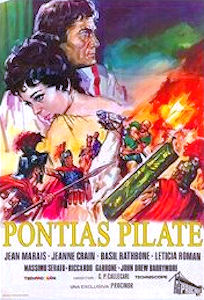| Pontius Pilate | |
|---|---|
 1962 US theatrical poster | |
| Directed by | Gian Paolo Callegari Irving Rapper |
| Written by | Oreste Biancoli Gian Paolo Callegari Gino De Santis |
| Produced by | Glomer Film, Lux Compagnie Cinématographique de France |
| Starring | |
| Music by | Angelo Francesco Lavagnino |
Release dates |
|
Running time | 100 minutes; 93 minutes (Spain); 103 minutes (West Germany) |
| Countries | Italy, France |
| Languages | Italian French English |
| Box office | 1,455,058 admissions (France) [1] |
Pontius Pilate (Italian : Ponzio Pilato, French : Ponce Pilate) is an Italian drama film from 1962, directed by Gian Paolo Callegari and Irving Rapper, written by Oreste Biancoli, starring Jean Marais and Jeanne Crain. [2] [3] [4]
Contents
The film is known under the titles: Ponce Pilate (France), Poncio Pilatos (Spain), Pontius Pilate (UK / US), Pontius Pilatus – Statthalter des Grauens (Germany). [5]
John Drew Barrymore plays the characters of both Judas Iscariot and Jesus of Nazareth. [6]
The scenario is based mainly on the Gospel of John. The following biblical passages are quoted in the film: Matthew 27:11; Mark 15:2; Luke 23:1; John 18:33; 18:37; John 18:38; 19:9-11; Matthew 27:24; Deuteronomy 21:6-7; John 19:19-21; 19:22. [7]
This film takes a perspective on events surrounding the Passion of Jesus Christ by focusing on Pontius Pilate, the Procurator of Judea who condemned Him to death. Pilate is a man for whom nothing seems to go as planned.
The film was produced in Italy and released there on 15 February 1962.